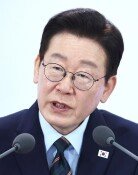Samsung’s investment plan hoped to help the nation’s economy
Samsung’s investment plan hoped to help the nation’s economy
Posted August. 26, 2021 07:25,
Updated August. 26, 2021 07:25
Samsung announced a plan on Tuesday to invest 240 trillion won in the semiconductor and bio sectors for the next three years and directly hire 40,000 new employees. The investment amount, which is much more than its 180 trillion won investment plan three years ago, is the highest record for a single company. The new plan came out 11 days after Vice Chairman Lee Jae-yong was released on parole. The plan aims to secure leadership in strategic businesses, such as semiconductors, in the global market and provide a number of high-quality jobs in South Korea.
Samsung had been hesitant to make an investment decision for the ultra-fine process needed to catch up with Taiwan’s TSMC in the foundry sector and chased by Intel, which is showing a strong will for semiconductor manufacturing. Lee made a quick investment decision to further solidify the company’s predominance in the memory semiconductor sector with a market share of 44 percent and become the No. 1 company in the foundry sector. It is good news that Samsung decided to make a large-scale investment in the semiconductor industry, which is the safety valve of the South Korean economy, before too late. The company also finalized a plan to invest in the bio sector, which has emerged as one of the key next-generation industries, and developed a draft plan for M&As in the artificial intelligence, 5G, and automotive electronics sectors, which had been suspended.
In the first half of this year, most large companies in South Korea saw a two-fold increase in operating profits from last year but only hired a few employees. The number of the young unemployed reached 300,000 last month. The announcement of Samsung’s plan to directly hire 40,000 new employees is meaningful against the current situation. It is also commendable that Samsung decided to invest 180 trillion won of the total investment in South Korea, which is expected to create 560,000 jobs. Given Samsung’s leadership role in the South Korean business sector, other companies may follow suit.
“It is to fulfill the roles of a business against the economic and societal challenges in the future,” said Samsung along with the announcement of the investment and recruitment plan. The company’s decisions to maintain open recruitment for new employees while most large companies are abolishing it and to expand software training, which is helpful for young people’s job searching, across the country also seem to be based on the same intention. The government should ease regulations and provide other support so that Samsung’s expanded investment and recruitment can spread across the South Korean industries.





![‘노인 냄새’ 씻으면 없어질까?…“목욕보다 식단이 더 중요”[노화설계]](https://dimg.donga.com/c/138/175/90/1/wps/NEWS/IMAGE/2026/02/27/133434557.3.jpg)

